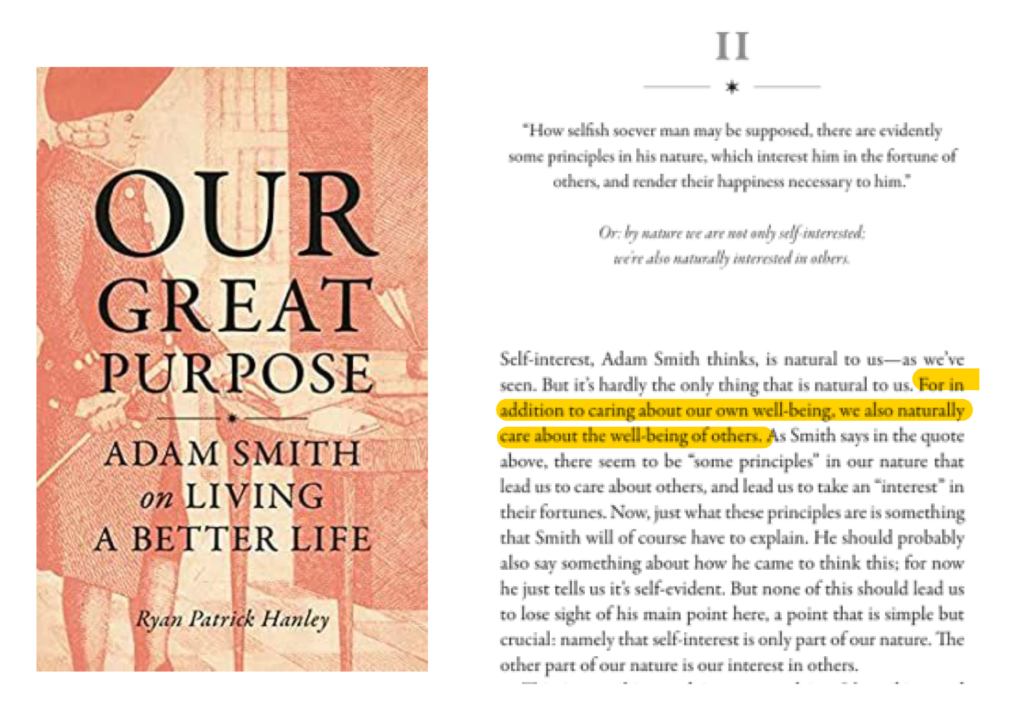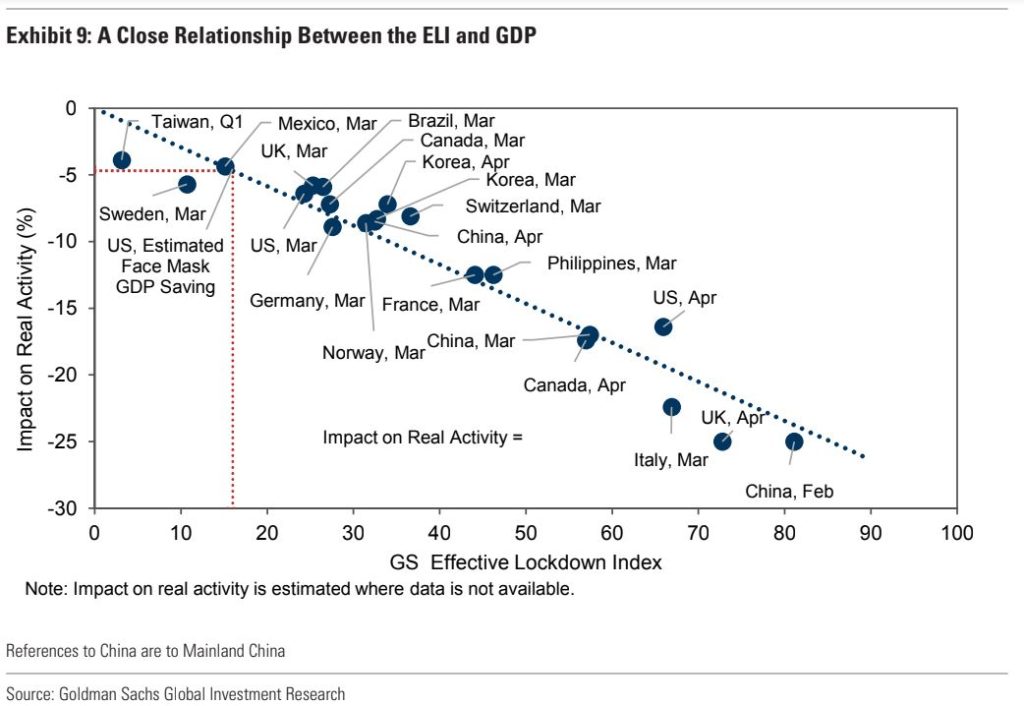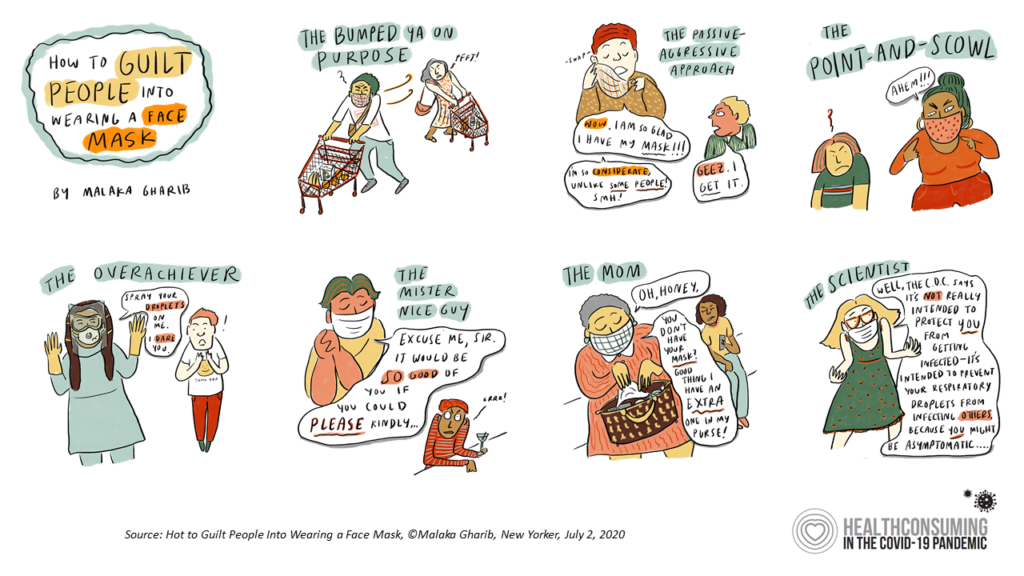“And please…please…please wear a face covering,” Dr. Jerome Adams, the U.S. Surgeon General pleaded on June 30, 2020, during a speech to U.S. Public Health Workers. [You can fast forward to second #42 to hear Dr. Adams’ impassioned plea to his fellow Americans.
s
 Wearing a mask or face covering reminds me of an early economics lesson from Adam Smith: that actions I take that are good for you can be good for me.
Wearing a mask or face covering reminds me of an early economics lesson from Adam Smith: that actions I take that are good for you can be good for me.
“In addition to caring about our own well-being, we also naturally care about the well-being of others,” Ryan Patrick Hanley wrote in his assessment of Adam Smith’s work in Our Great Purpose. Hanley’s lens on Smith is on how we can live better lives that benefit ourselves and others at the same time.
“Living a good life in the kind of world in which we live today requires us to develop certain capacities, skills, and virtues that enable us to flourish amid the unique temptations and constraints of a market society,” Hanley says. “Smith shared with ancient thinkers like Aristotle an interest in human flourishing.”
In thinking of others, we move toward our individual great purposes. In this moment, one of these great purposes that’s simple to achieve is wearing a face covering as we face rising risks in the coronavirus pandemic.
 Adam Smith would appreciate the latest work by the chief economist at Goldman Sachs, Jan Hatzius. Hatzius wrote a report last week featuring a financial model that calculates the economic value of mask-wearing among people living in the United States. He forecasted that, by the nation’s residents donning face coverings, the U.S. GDP could be boosted by 5%. Here’s coverage of the report to Goldman Sachs clients from MarketWatch.
Adam Smith would appreciate the latest work by the chief economist at Goldman Sachs, Jan Hatzius. Hatzius wrote a report last week featuring a financial model that calculates the economic value of mask-wearing among people living in the United States. He forecasted that, by the nation’s residents donning face coverings, the U.S. GDP could be boosted by 5%. Here’s coverage of the report to Goldman Sachs clients from MarketWatch.
The chart labeled Exhibit 9 from the Goldman Sachs report illustrates the relationship between the “effective lockdown index” and GDP. You can see the position of the U.S. in April 2020; with universal mask-wearing, the U.S. could shift up and to the left toward the positive example of Taiwan in the first quarter of 2020. [As a sidebar, I am mindful that Taiwan’s leader is President Tsai Ing-wen, the first female leader of the nation elected in 2016. Various analyses have found that countries led by women have fared relatively better in the pandemic, looking at leaders like Jacinda Ardern of New Zealand, Angela Merkel of Germany, and Denmark’s Prime Minister, Mette Frederiksen].
 Goldman Sachs’ 5% GDP conserved-due-to-mask-wearing would be a significant fiscal upside, especially considering that this year, the U.S. GDP is projected to decline by 8.0% based on the most recent forecast of the International Monetary Fund (IMF).
Goldman Sachs’ 5% GDP conserved-due-to-mask-wearing would be a significant fiscal upside, especially considering that this year, the U.S. GDP is projected to decline by 8.0% based on the most recent forecast of the International Monetary Fund (IMF).
In their June 2020 Outlook Update, the IMF believes that, “The COVID-19 pandemic has had a more negative impact on activity in the first half of 2020 than anticipated, and the recovery is projected to be more gradual than previously forecast…The adverse impact on low-income households is particularly acute, imperiling the significant progress made in reducing extreme poverty in the world since the 1990s.”
IMF emphasizes that, “All countries — including those that have seemingly passed peaks in infections — should ensure that their health care systems are adequately resourced.”
 In the uncertainties cited by the IMF, several resonate with the current U.S. situation — namely, the length of the pandemic and required lockdown; voluntary social distancing, which will affect spending; and, displaced workers’ ability to secure employment.
In the uncertainties cited by the IMF, several resonate with the current U.S. situation — namely, the length of the pandemic and required lockdown; voluntary social distancing, which will affect spending; and, displaced workers’ ability to secure employment.
As we enter Independence Day weekend, we should take another look at the Declaration of Independence which feels like it has special meaning right now.
The line most people knows the best is,
“We hold these truths to be self-evident, that all men are created equal, that they are endowed by their Creator with certain unalienable rights, that among these are Life, Liberty and the Pursuit of happiness.”
The U.S. National Archives notes that these words were designed to convince Americans to put their lives on the line for “the cause.” The risks of that cause, separation from England, threatened peoples’ sense of security, economic stability, and identity.
Today, we have the privilege of re-forging our American identity, together, by wearing a mask or face covering to help secure each other’s health, economic livelihood, and cohesion as Americans, together.
As my colleague Jim Weiss, CEO and Founder of W2O Group, says right now along with others on Twitter and Instagram: #WearTheDamnMask.
 I leave you with some very current humor from The New Yorker magazine by cartoonist Malaka Gharib on how to guilt people into wearing a face mask. I admit to having assumed several of these personae when masked, out-and-about in retail, walking on the street, and hiking in parks. [Note that Malaka calls herself a Filipino Egyptian American and recently published her memoir, I Was Their American Dream].
I leave you with some very current humor from The New Yorker magazine by cartoonist Malaka Gharib on how to guilt people into wearing a face mask. I admit to having assumed several of these personae when masked, out-and-about in retail, walking on the street, and hiking in parks. [Note that Malaka calls herself a Filipino Egyptian American and recently published her memoir, I Was Their American Dream].
Be well, and make a mask your higher purpose as we walk together through the other side of the pandemic. This would be a collective embrace of our health citizenship.




 Interviewed live on BNN Bloomberg (Canada) on the market for GLP-1 drugs for weight loss and their impact on both the health care system and consumer goods and services -- notably, food, nutrition, retail health, gyms, and other sectors.
Interviewed live on BNN Bloomberg (Canada) on the market for GLP-1 drugs for weight loss and their impact on both the health care system and consumer goods and services -- notably, food, nutrition, retail health, gyms, and other sectors. Thank you, Feedspot, for
Thank you, Feedspot, for  As you may know, I have been splitting work- and living-time between the U.S. and the E.U., most recently living in and working from Brussels. In the month of September 2024, I'll be splitting time between London and other parts of the U.K., and Italy where I'll be working with clients on consumer health, self-care and home care focused on food-as-medicine, digital health, business and scenario planning for the future...
As you may know, I have been splitting work- and living-time between the U.S. and the E.U., most recently living in and working from Brussels. In the month of September 2024, I'll be splitting time between London and other parts of the U.K., and Italy where I'll be working with clients on consumer health, self-care and home care focused on food-as-medicine, digital health, business and scenario planning for the future...